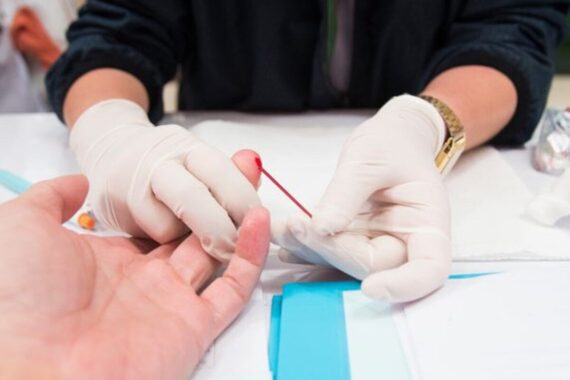The Government has announced it will spend extra £1.5m to help meet its target of ending HIV transmissions in England by 2030.
The money will be spent on more than 20,000 self-testing and self-sampling kits, and on extending the national HIV prevention programme by a year.
The goal will be to increase testing, reduce stigma, tackle health disparities and raise awareness, the Government said.
Announcing the measures, Prime Minister Keir Starmer took a self-test for HIV on camera to highlight that testing is quick, easy, free and confidential.
He said: ‘It is really important to do it, and I am pleased to have taken part too. If people test, they will know their status. It is better that people know and that is a good thing because you can then get treatment to help meet our target to end new HIV transmissions by 2030.’
A survey by YouGov found that more than 80% of adults in England are unaware it is possible to test for HIV at home.
But respondents also indicated that at-home testing would be the most popular way to know your HIV status, with 44% of people saying it would be their preference.
Figures from the UK Health Security Agency showed that in 2023, testing in community settings – such as nightclubs, festivals and voluntary sector premises – increased by 7% compared to 2022. A quarter of all tests were reported among individuals being tested for HIV for the first time.
Speaking in Parliament, public health and prevention minister Ashley Dalton announced the extension of the programme, and said: ‘Increasing HIV testing is a vital step towards meeting our goal and will be a core element of our new HIV action plan published later this year. That’s why we are investing over £4.5 million to deliver a national prevention programme.
‘And that’s why today, I can announce that we will extend the programme for a further year to March 2026, backed by an extra £1.5 million.’
Health secretary Wes Streeting said: ‘As a former member of the independent HIV commission, I’m determined that this Government will deliver our commitment to end new transmissions of HIV in England by 2030 and we’ll set this out shortly in our new action plan.’
An extension to the NHS England opt-out HIV testing in emergency departments was announced in 2023.
NHS England chief executive Amanda Pritchard said that boosting opportunities to test for HIV is ‘crucial’.
She said: ‘Increasing the early detection and diagnoses of HIV enables the NHS to provide people with better access to the latest and most effective life-saving medication, which can prevent long-term health issues and reduces the chance of unknown transmissions to others. We would encourage anyone who could be living with HIV to order a test and get checked.’












